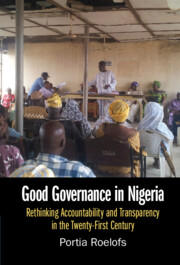Book contents
- Good Governance in Nigeria
- Good Governance in Nigeria
- Copyright page
- Dedication
- Epigraph
- Contents
- Figures
- Tables
- Acknowledgements
- Abbreviations
- Major Characters
- Map of Nigeria
- Additional material
- Introduction
- 1 Contested Legacies of Good Governance
- 2 Good Governance, What’s Not to Love?
- 3 Be Accessible! Accountability, Performance and the Politician Who Is ‘Always in a Meeting’
- 4 Theorising Accountability as Accessibility
- 5 Transparency in People
- 6 Socially Embedded Good Governance
- Conclusion
- Appendix: Methods and Methodology
- Glossary of Yoruba Terms
- Select Bibliography
- Index
5 - Transparency in People
Information, Cabals and the Politics of Hidden Networks
Published online by Cambridge University Press: 13 April 2023
- Good Governance in Nigeria
- Good Governance in Nigeria
- Copyright page
- Dedication
- Epigraph
- Contents
- Figures
- Tables
- Acknowledgements
- Abbreviations
- Major Characters
- Map of Nigeria
- Additional material
- Introduction
- 1 Contested Legacies of Good Governance
- 2 Good Governance, What’s Not to Love?
- 3 Be Accessible! Accountability, Performance and the Politician Who Is ‘Always in a Meeting’
- 4 Theorising Accountability as Accessibility
- 5 Transparency in People
- 6 Socially Embedded Good Governance
- Conclusion
- Appendix: Methods and Methodology
- Glossary of Yoruba Terms
- Select Bibliography
- Index
Summary
Standard approaches to transparency emphasise transparency in data: the principle that data about government activity should be accessible and accurate. This chapter draws on in-depth fieldwork in southwest Nigeria to show how standard data-focused efforts are insufficient to meet popular demands for a government that is knowable and visible. Transparency in data is only one conception of the core concept of transparency. Transparency in things involves demonstrating transparency through the delivery of tangible, concrete outputs, whereas transparency in people demands that the social networks, relations and obligations in which their leaders are embedded should be made legible. Political competition in twenty-first century southwest Nigeria exemplifies the tensions between these rival conceptions of transparency. Whilst the technocratic reforms of the ‘Lagos model’ meant that more government data were in the public domain, there was widespread popular suspicion that official documents may be hiding as much as they reveal. Two examples from Oyo State in the 2010s show how sensitivity to these alternative conceptions of transparency helps explain otherwise counter-intuitive popular responses to government efforts at ‘good governance’. A final section explores the possible consequences of failing to attend to transparency in people, drawing on examples of populist politics in Nigeria and elsewhere.
Keywords
- Type
- Chapter
- Information
- Good Governance in NigeriaRethinking Accountability and Transparency in the Twenty-First Century, pp. 207 - 233Publisher: Cambridge University PressPrint publication year: 2023

